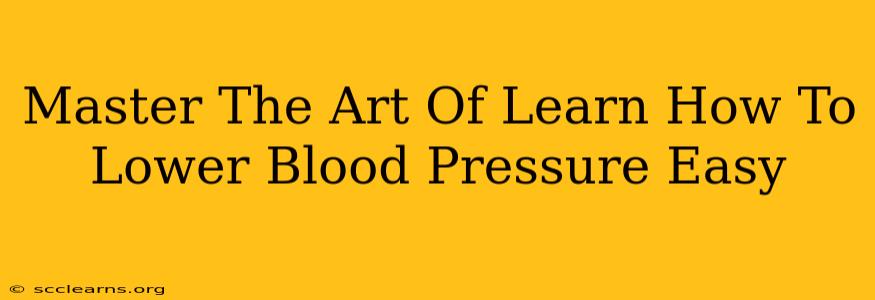High blood pressure, or hypertension, is a silent killer affecting millions worldwide. But the good news is, you can take control and significantly lower your blood pressure through lifestyle changes. This comprehensive guide will equip you with the knowledge and tools to master the art of managing your blood pressure naturally and effectively.
Understanding Your Blood Pressure
Before diving into strategies, let's understand what blood pressure is and why it's crucial to keep it in check. Blood pressure is the force of your blood against your artery walls. It's measured in two numbers: systolic (the top number) and diastolic (the bottom number). High blood pressure consistently puts extra strain on your heart, blood vessels, and organs, increasing your risk of heart disease, stroke, and kidney failure.
Identifying High Blood Pressure
High blood pressure is typically diagnosed when your blood pressure consistently reads 140/90 mmHg or higher. It's important to regularly monitor your blood pressure, either at home or through regular check-ups with your doctor. Don't ignore elevated readings; consult your physician immediately.
Easy and Effective Ways to Lower Your Blood Pressure Naturally
Now, let's explore practical strategies you can implement to lower your blood pressure:
1. Dietary Changes: Fueling Your Body for Lower Blood Pressure
- Reduce Sodium Intake: Sodium is a major contributor to high blood pressure. Limit processed foods, fast food, and restaurant meals, which are often high in sodium. Choose fresh, whole foods instead.
- Increase Potassium Intake: Potassium helps balance sodium levels. Good sources include bananas, potatoes, spinach, and beans.
- Embrace the DASH Diet: The Dietary Approaches to Stop Hypertension (DASH) diet emphasizes fruits, vegetables, whole grains, lean protein, and low-fat dairy. It's proven highly effective in lowering blood pressure.
- Limit Saturated and Trans Fats: These unhealthy fats raise cholesterol levels, contributing to high blood pressure. Opt for healthy fats like olive oil, avocados, and nuts.
2. Lifestyle Modifications for Lasting Results
- Regular Exercise: Aim for at least 150 minutes of moderate-intensity aerobic exercise per week. This could include brisk walking, swimming, or cycling. Physical activity strengthens your heart and improves blood vessel function.
- Weight Management: If you're overweight or obese, losing even a small amount of weight can significantly lower your blood pressure. Combine diet and exercise for optimal results.
- Stress Reduction: Chronic stress raises blood pressure. Practice stress-management techniques like yoga, meditation, or deep breathing exercises. Prioritize relaxation and mindfulness.
- Limit Alcohol Consumption: Excessive alcohol intake can raise blood pressure. If you drink alcohol, do so in moderation.
- Quit Smoking: Smoking damages blood vessels and increases blood pressure. Quitting is one of the best things you can do for your overall health.
3. Monitoring and Medical Guidance
- Regular Blood Pressure Monitoring: Regularly monitor your blood pressure at home and record the readings. This helps you track your progress and identify any potential issues.
- Consult Your Doctor: Work closely with your doctor to develop a personalized plan. They can help you determine the best course of action based on your individual health needs and risk factors. They might suggest medication if lifestyle changes aren't enough.
Mastering Your Blood Pressure: A Journey, Not a Sprint
Lowering blood pressure is a journey that requires commitment and consistency. It's not about quick fixes, but about adopting long-term healthy habits. By implementing the strategies outlined above and working closely with your doctor, you can master the art of managing your blood pressure and significantly improve your overall health and well-being. Remember, your health is your most valuable asset – invest in it!

